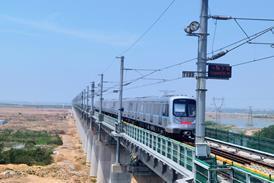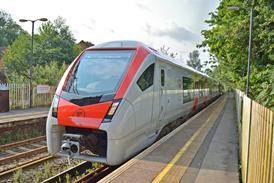INTRO: SNCF’s main line passenger business faces the challenge this year of building on the strong results of 1998. Managing Director, Passenger Services, Guillaume Pepy spoke to Robert Preston about the innovations that have fuelled growth and which he hopes will sustain the upward trend
BYLINE: Guillaume Pepy
Managing Director, Passenger Services, SNCF
Describing 1998 as ’altogether an exceptional year’, Guillaume Pepy sees three factors contributing equally to the best performance by SNCF’s main line passenger business for 10 years. The strong condition of the French economy was responsible for around one-third of the growth that saw traffic rise by 10·2% in the first nine months of 1998, compared with the same period in 1997. Receipts were up 9% due to a slight fall in the average ticket price.
The second reason for these results is to be found in service enhancements such as the regular-interval TGV timetable on the Paris - Lyon and Paris - Lille routes, and what Pepy sees as an ’almost’ regular-interval service pattern to Brussels with Thalys and to London by Eurostar. Regular-interval high-speed services and a better timetable for Corail services on conventional routes have formed part of a rolling programme launched on February 23 1996, which has seen SNCF making commitments to its passenger and freight customers at national, regional and local level (p48).
Simpler fares
This programme has also included changes to the fares structure to make taking the train ’simpler and cheaper’, and Pepy sees this as the third reason for strong growth in 1998. He notes that over the past two years the number of passengers eligible for a discount on the full fare has risen from 70% to 74% of main line customers. Business from the youth market has risen by 15% since June 1 1997, following the introduction of new fares and a new railcard for passengers aged between 12 and 25.
The current business plan for SNCF as a whole assumes the loss of Fr1bn in 1997 will fall to Fr0·5bn in 1998, and SNCF President Louis Gallois expects this target to be met as long as the economic climate remains favourable. But there is increasing uncertainty as to whether growth will be sustained into 1999, when SNCF is expected to break even and then achieve lasting profitability to fund investment. In 1999 main line passenger traffic is expected to grow by another 5%, which Pepy sees as a ’very ambitious’ target that may be harder to achieve than the growth recorded in 1998.
In broad terms, the main line commercial strategy is based on the use of yield-management techniques to attract the maximum number of passengers outside peak hours, whilst charging the lowest possible fares. Pepy cites the example of the Fr99 Paris - Lille single fare for passengers aged between 12 and 25, which he sees as an example of a ’very aggressive’ pricing policy that offers serious competition to road. He is also keen to develop a service culture ’worthy of that name’ within SNCF, closer to the customer’s wishes and hopefully meeting their aspirations before, during and after the train journey.
During 1999 the main line business expects to enter the second phase of a programme to upgrade conventional services, which has so far concentrated on Corail trains. Trials should begin this year of a prototype fixed-formation trainset made up of refurbished Corail coaches, no longer branded as such, and featuring new interiors with family compartments, public telephones and bicycle storage as well as improved inter-car gangways.
Formations of five, six or nine cars, with a centre bar/amenity coach, could eventually be deployed on busier routes such as Paris - Clermont Ferrand, Bordeaux - Marseille or Paris - Strasbourg pending the completion of TGV Est.
Commitment to the customer
Pepy believes that the commitments made by SNCF to its main line passengers have had a very positive effect in rebuilding customer confidence. He singles out the measure introduced on September 1 1996 providing a 25% refund for all delays of between 30min and 1h to journeys over 100 km, which rises to 50% if the passenger is delayed by over 1h. Contrasting this policy with the airlines and noting that motorway tolls are never reimbursed when there are delays, Pepy says that the refunds are automatic and that ’we don’t argue’.
The facility enabling passengers to receive by post tickets purchased from SNCF’s national telesales service has also been deemed a great success, with 830000 tickets sent out in the two years following its introduction in September 1996 and sales in 1998 up 90% on 1997 at 481000 tickets. Other measures have not been so successful, including the 200 daily ’green’ trains where from December 1 1996 a 15% reduction was available to all customers and reservations were not required, even on TGVs.
Further simplification of the national fares structure and the extension of a 25% reduction to more passengers rendered these trains superfluous, and on May 23 1998 they were abolished in the name of simplification. On June 1 1998 SNCF relaunched an undertaking first made on July 1 1996 to keep passengers informed should a train come to an unexpected stop lasting 5min or more.
Pepy believes that the commitments have had another positive effect in motivating staff, concentrating their attention on concrete goals that will contribute to the process of turning SNCF into a true business with the customer at its heart. Noting that ’the SNCF of tomorrow will be built with the railwaymen of today’, he thinks that staff must be brought into closer contact with the passenger and that a true service culture must develop.
International and overnight
International services currently account for 20% of the turnover generated by the main line passenger business, and for 17% of the traffic it carries each year. With 50% of this total traffic now moving in TGVs, it comes as little surprise that the high-speed train is leading the SNCF charge for international passenger business. Pepy sees Europe as the ’ideal continent’ for high-speed services, but thinks that there is still a niche for conventional overnight services to leisure destinations such as Firenze, Barcelona, München and Praha.
Due to the distances involved, there is also some potential for overnight services from Paris to destinations including Frankfurt-am-Main and Zürich, as well as on many internal routes. But for the latter Pepy states baldly that SNCF ’does not believe’ in the hotel-train concept, citing the comprehensive TGV network and the lower cost of hotel accommodation in France. In 2000 trials are due to begin with an overnight coach specifically refurbished for the family market, offering basic accommodation at a reasonable price.
Pepy sees ’very strong potential’ for Eurostar under the Unified Management Team that is being established by SNCF, SNCB and Eurostar (UK) Ltd, which should give greater emphasis on marketing and sales to attract target markets such as groups and tour operators. In a parallel move, SNCF and SNCB have joined British Airways and National Express of Great Britain to form Intercapital & Regional Railways Ltd, which is responsible for operating Eurostar (UK) Ltd for Channel Tunnel Rail Link concessionaire London & Continental Railways under the Eurostar Management Agreement.
Changes ahead for Eurostar include a new on-train catering contract, which was due to go out to tender at the end of 1998 in order to start in 2000. Bidders may include Wagons-Lits, which since January 1 1998 has been the major on-train provider to SNCF. This contractor is undertaking what Pepy describes as a ’very ambitious’ overhaul of on-train service, and future developments are likely to include changes to trolley service and the introduction of automatic vending.
CAPTION: TGV Duplex sets have increased capacity on the Sud-Est corridor between Paris and Lyon where regular interval services have been introduced
Making commitments
As part of its reform programme, SNCF launched on February 23 1996 a national consultation process with its passengers and freight customers. This led in June of that year to the start of a rolling programme of commitments at national, regional and local level to make train travel simpler, cheaper and more practical. A further survey was conducted between November 24 and December 5 1997. Some of the major commitments for main line customers are presented below with their date of introduction.
July 1996: Passengers to be informed on trains of the reason for all delays over 5min.
September 1996: Refunds for all delays over 30min.
Programme to improve waiting areas, toilets and other station facilities.
Tickets ordered by phone sent out by post for no extra charge.
June 1997: ’Découverte’ fare for passengers aged between 12 and 25 or two of any age travelling together, offering a 25% reduction on the basic ticket price.
New railcard for passengers aged between 12 and 25, costing Fr270 and offering a 50% (subject to availability) or 25% reduction for a year.
Information kiosks in 120 stations.
April 1998: Door-to-door baggage service with delivery within 24h at a cost of Fr95 for the first piece and Fr60 for as many as two additional bags.
’Découverte’ fare offering a 25% reduction on return journeys over 200 km including a Saturday night away.
’Découverte’ fare offering 25% discount for passengers over 60, or travelling with childen under 12.
New railcard for passengers over 60, costing Fr285 and offering a 50% or 25% reduction for a year.
November 1998: Further simplification of TGV fares structure, with one price tier in first class and two in second.
Vers une année record
Le trafic des grandes lignes de la Société Nationale des Chemins de fer Français doit relever le défi de présenter des résultats au moins aussi bon que ceux de 1998. Des changements dans la grille des tarifs ont rendu le voyage en train plus simple et moins cher, aidant ainsi à regagner la confiance des clients. Le Directeur Général Délégué, Clientèles, Guillaume Pepy a fixé l’objectif sur une croissance de 5% pour 1999
Informations clés:
Trafic grandes lignes en hausse de 10·2% en 1998 (9 mois);
Recettes en hausse de 9% en 1998;
En 1999, début d’essais de circulation de rames Corail à composition fixe;
Marché limité pour les trains de nuit internationaux;
Aucune foi dans la pertinence des trains h




















